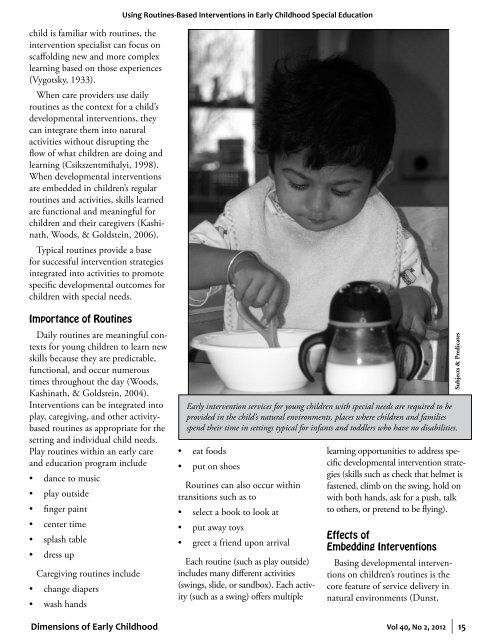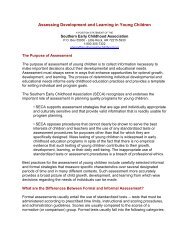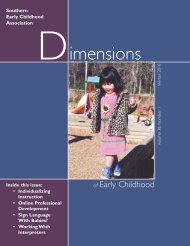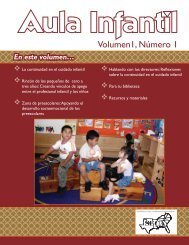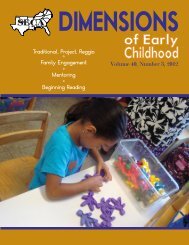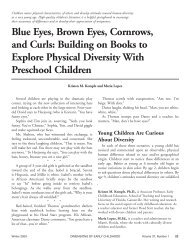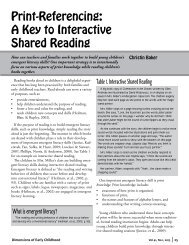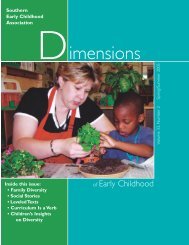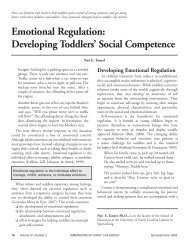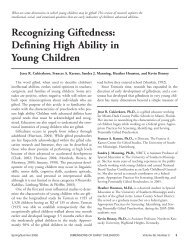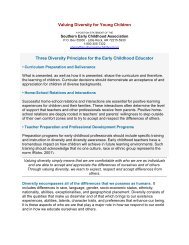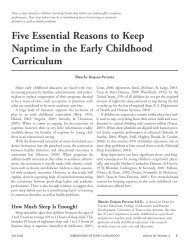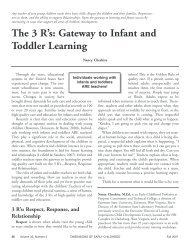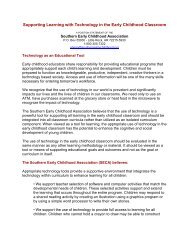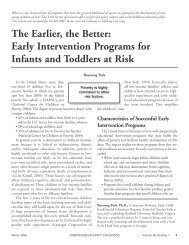Water Play - Southern Early Childhood Association
Water Play - Southern Early Childhood Association
Water Play - Southern Early Childhood Association
Create successful ePaper yourself
Turn your PDF publications into a flip-book with our unique Google optimized e-Paper software.
child is familiar with routines, the<br />
intervention specialist can focus on<br />
scaffolding new and more complex<br />
learning based on those experiences<br />
(Vygotsky, 1933).<br />
When care providers use daily<br />
routines as the context for a child’s<br />
developmental interventions, they<br />
can integrate them into natural<br />
activities without disrupting the<br />
flow of what children are doing and<br />
learning (Csikszentmihalyi, 1998).<br />
When developmental interventions<br />
are embedded in children’s regular<br />
routines and activities, skills learned<br />
are functional and meaningful for<br />
children and their caregivers (Kashinath,<br />
Woods, & Goldstein, 2006).<br />
Typical routines provide a base<br />
for successful intervention strategies<br />
integrated into activities to promote<br />
specific developmental outcomes for<br />
children with special needs.<br />
Using Routines-Based Interventions in <strong>Early</strong> <strong>Childhood</strong> Special Education<br />
Importance of Routines<br />
Daily routines are meaningful contexts<br />
for young children to learn new<br />
skills because they are predictable,<br />
functional, and occur numerous<br />
times throughout the day (Woods,<br />
Kashinath, & Goldstein, 2004).<br />
Interventions can be integrated into<br />
play, caregiving, and other activitybased<br />
routines as appropriate for the<br />
setting and individual child needs.<br />
<strong>Play</strong> routines within an early care<br />
and education program include<br />
• dance to music<br />
• play outside<br />
• finger paint<br />
• center time<br />
• splash table<br />
• dress up<br />
Caregiving routines include<br />
• change diapers<br />
• wash hands<br />
<strong>Early</strong> intervention services for young children with special needs are required to be<br />
provided in the child’s natural environments, places where children and families<br />
spend their time in settings typical for infants and toddlers who have no disabilities.<br />
• eat foods<br />
• put on shoes<br />
Routines can also occur within<br />
transitions such as to<br />
• select a book to look at<br />
• put away toys<br />
• greet a friend upon arrival<br />
Each routine (such as play outside)<br />
includes many different activities<br />
(swings, slide, or sandbox). Each activity<br />
(such as a swing) offers multiple<br />
learning opportunities to address specific<br />
developmental intervention strategies<br />
(skills such as check that helmet is<br />
fastened, climb on the swing, hold on<br />
with both hands, ask for a push, talk<br />
to others, or pretend to be flying).<br />
Effects of<br />
Embedding Interventions<br />
Basing developmental interventions<br />
on children’s routines is the<br />
core feature of service delivery in<br />
natural environments (Dunst,<br />
Subjects & Predicates<br />
Dimensions of <strong>Early</strong> <strong>Childhood</strong> Vol 40, No 2, 2012 15


